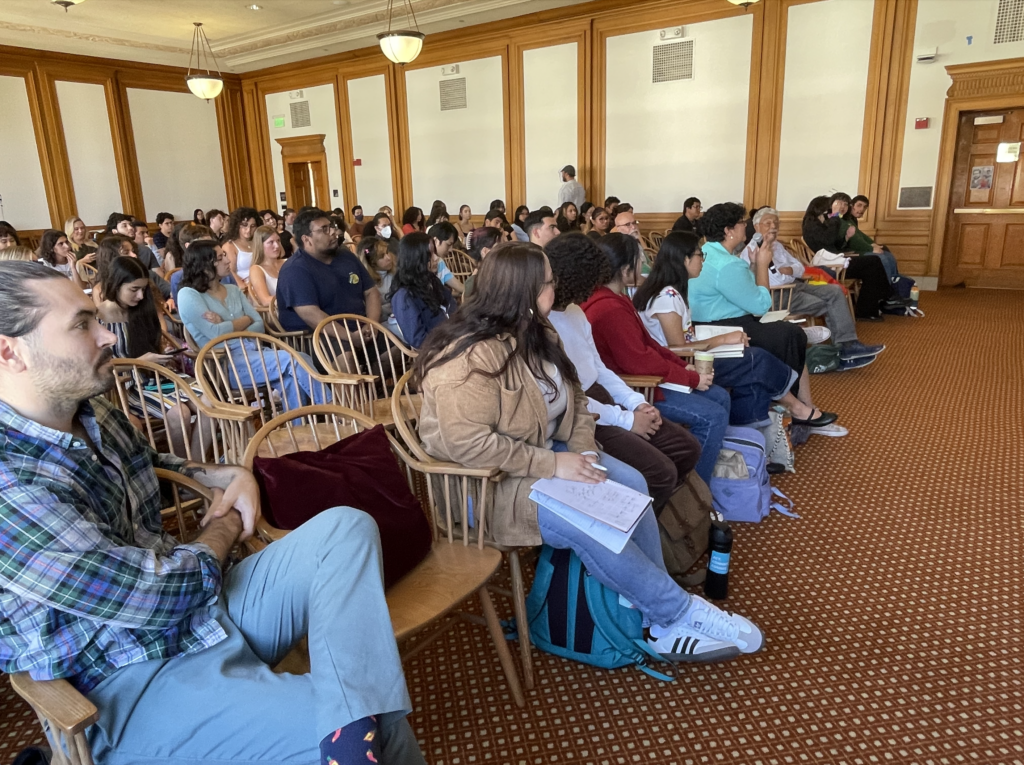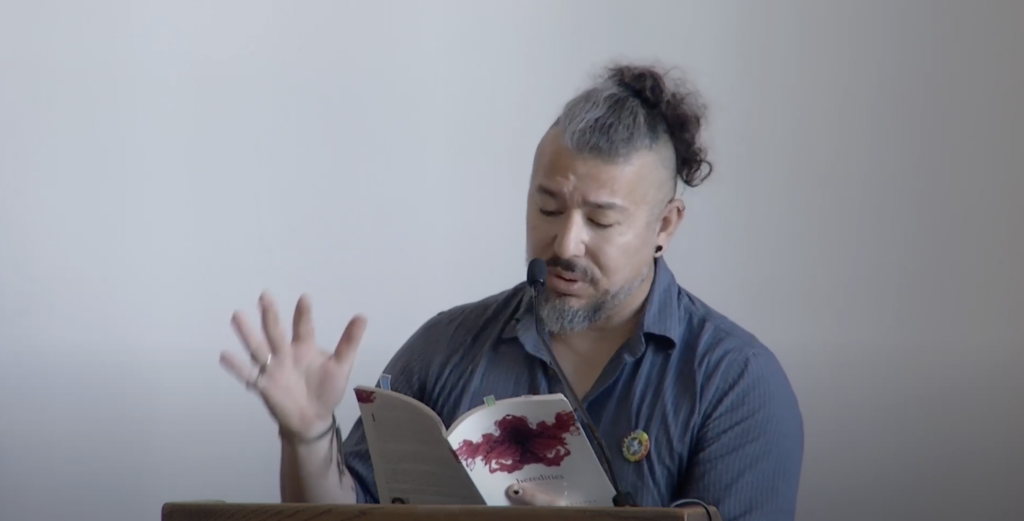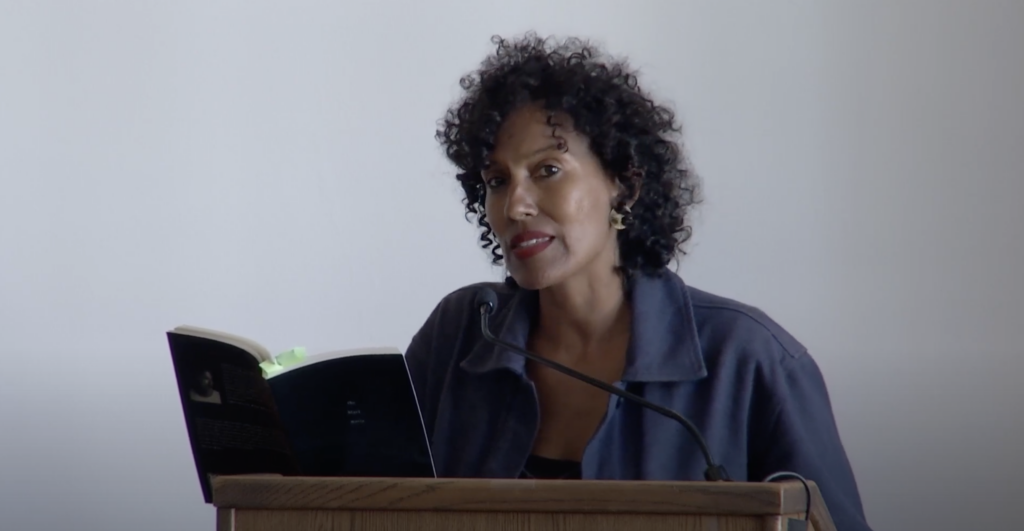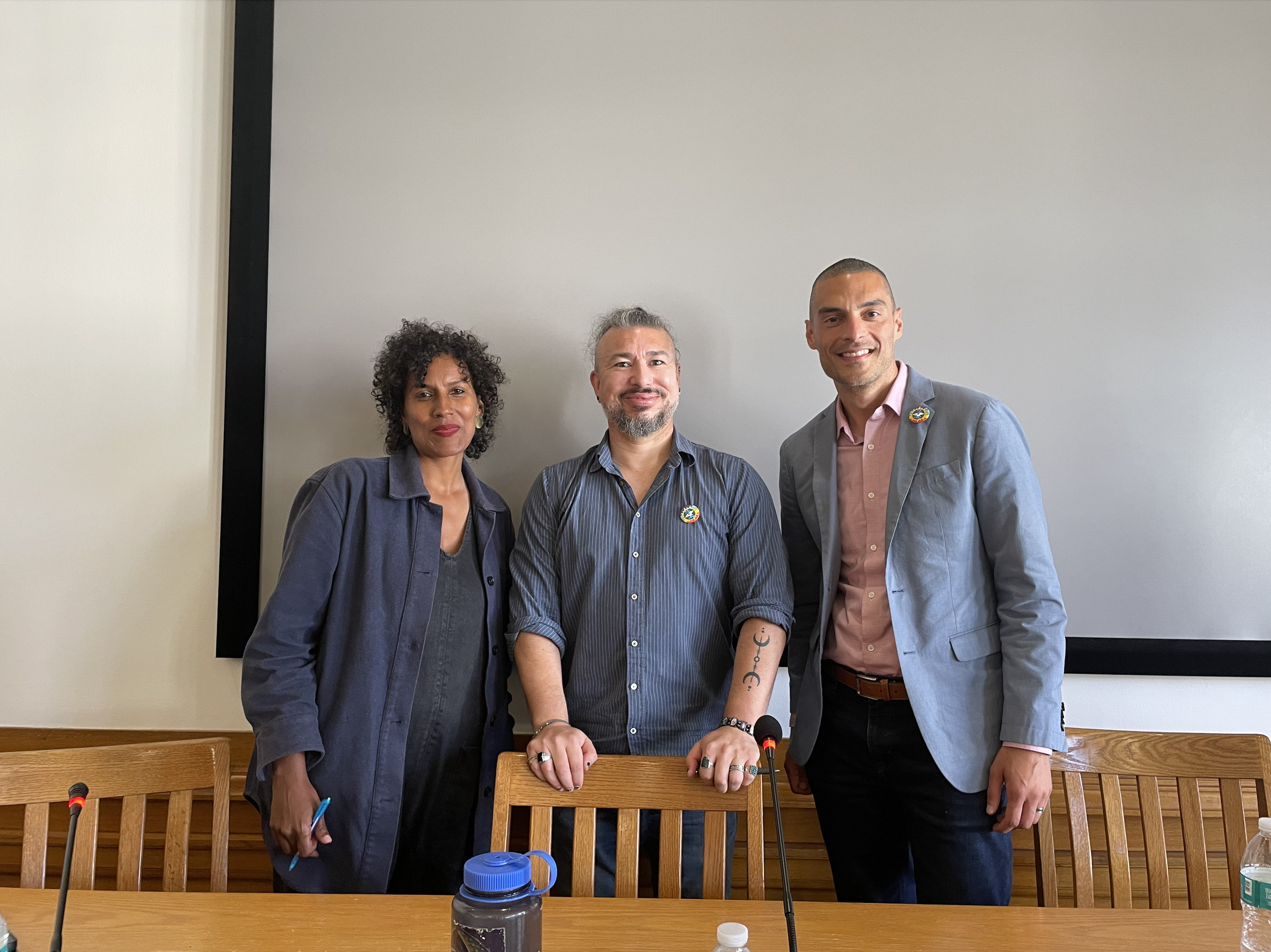by Eva Whitney, January 30, 2024
Latinx poets J. Michael Martinez and Aracelis Girmay came together at UC Berkeley on September 28, 2023 for a reading of their work, followed by a conversation with Professor John Alba Cutler (event info here). The full recording of the event is available for viewing on ARC’s YouTube channel, here.

What does it mean to be a Latinx poet? How is one’s identity at play in their artwork? Is a poem a static artifact, or a living thing? On September 28, poets J. Michael Martinez and Aracelis Girmay set out to explore these questions through readings of their work and a conversation facilitated by Professor John Alba Cutler. The room, busy and bright, was filled with Professor Cutler’s students who had recently read the poets’ work. Their attentiveness held Martinez and Girmay’s work tightly.
Martinez began by reading from his book Heredities (Lousiana State University Press, 2010). Assistant professor in the Department of English and Comparative Literature at San Jose State University, Martinez is the recipient of the Walt Whitman Award from the Academy of American Poets and the author of three collections of poetry including Museum of the Americas (Penguin Random House, 2018), which was a winner of the National Poetry Series Competition and long-listed for the 2018 National Book Award in Poetry. Steeped in mystical, natural language, his poetry is grounded, dreamy, and playful at the same time. In his poem “White Song,” the natural meets the feminine, delivering soft and deathly lines such as “grandmother is the word for / white image and apples.” His images are distorted, collapsing into each other: “the word / is stem and apples falling. / fall speech fall: she is speech- / fallen.” While reading, Martinez’s voice blended words, emphasizing repetition, and creating a hurried rhythm.

While his older works face mortality, the feminine, and mythology, his newer books, Museum of the Americas and Tarta Americana (Penguin Random House, 2023), focus more directly on his personal experiences and his “latinidad” to use Professor Cutler’s language. In “Lord, Spanglish Me,” Spanish and English merge unexpectedly: “Boil the orange rind behind the syntax peeled of her name / Translate naranja into familia.” Images of the domestic are representative of Martinez’s relationship to his family’s native tongue. Spanish folds itself in neatly, becoming a feature of his picturesque, pastoral landscape.
What is revealed in the use of Spanish that is hidden in English? “Ixiptla (9) Tlazōlteōtl, The Filth Eater” invokes Tlazōlteōtl, the Aztec deity of sexuality. Tracing a story of abuse, Martinez uses the idea of “filth” to illustrate a raw, gritty story, using images like “I squatted nude over a bowl of milk / on a mirror” and “peach-lit / & leech-lipped” that weave language together deftly. Martinez cuts to the center of experience in a way that is both bare and ornate.
Aracelis Girmay began her reading by reciting Lucille Clifton’s “Won’t you celebrate with me” from memory. The pithy, powerful poem set the tone for her work, nimble and delightful in its language. Author of the black maria (BOA, 2016), Kingdom Animalia (BOA, 2011), and Teeth (Curbstone, 2007), Girmay is a professor of English at Stanford University and a multimedia artist. Finalist for the Neustadt International Prize for Literature, she is the editor of So We Can Know: Writers of Color on Pregnancy, Loss, Abortion, and Birth (Haymarket, 2023) as well as the Blessing the Boats Selections. Girmay began by reading “the author to the dead” from the black maria. Much like Martinez, the poem uses the natural as a constant, impenetrable connection to the dead or a past place. She invokes the motion of the waves in the motion of brushing hair:
The long, dark skin of the water,
the talk, talking Aboy of the water,
the brushing back, brushing back my acacia hair,
washing my face. When we are done
I cross the sea […]
The natural and the human reflect each other, creating a sense of oneness that extends beyond time or form. Girmay, too, writes about the experience of being part of the Eritrean diaspora, of being part of a place down to her very cells, despite residing elsewhere:
“He says, moving his hand to mean “all around us,”
that this is my home. He means Adi Sogdo,
but he also means the world.
Though I think, in “America,”
She is her ancestors: “My bones are / your bones, he says. His teeth are my teeth / & my smiling is his smiling.” The harmony of all things rings through “the author to the dead.” Girmay can collapse borders; the past slips into the present, seas flow into each other, and memory comes alive at the slightest sound of a wave.

In section eight of the black maria, Girmay recounts her experience giving birth, reconstructing it as something not mundane but magical: “The body, bearing something ordinary as light.” As if outside of it, Girmay illustrates birth as an impossible creation, touching on how unlikely it was that her son was her son: “across the centuries, / inside the vastness of the galaxy, how improbable it is that this iteration / of you or you or me might come to be at all.” While birth is natural it is also alien, the body transforming inconceivably. “Each of us entering the world / & entering the world like this,” Girmay writes, stressing the “like this.”
Girmay’s poetry re-examines and re-makes the everyday. She, or the speaker, is enchanted by the present, taken by the splendor of the mundane. “[When I come home they rush to me, the flies]” takes houseflies seriously, recognizing them as living beings: “They hold one hand inside the other & say, Eat. They share the food, sit close to me, sit.” The flies are human: “The old one sits still, I sit with it.” The poem is devastating in its awareness of the silent and invisible plight of a fly; as the speaker leaves to run errands, the flies hang back, confined to the home, imprisoned and dying quickly. They are companions to the speaker, gently “whistling, touching [her] hair.” Girmay’s ability to reach the human experience through a poignant observation of a housefly is rare and profound. Her poetry is like a carefully crafted diary, weaving observation, memory, bits of language, natural materials, and photographs into a colorful, delicate, and living thing.

After their readings, the poets participated in a discussion with Professor Cutler. When asked how their Latinx identities enable or limit their poetry, both Martinez and Girmay pushed against the term—Martinez calls it “static” while Girmay sees it as a “vexxed, fraught term” that doesn’t feel accurate to where she places herself. While the vastness of latindad fascinates her, it is also an “empty tent of confluence that has political valence,” to use Martinez’s language. Martinez defines his goal as “to problemtize and to disrupt those kind of definitions,” while Girmay says “I’m never trying to argue or prove, I’m trying to feel something true.” Their work is a testament to this expansiveness—their poetry is an invitation to ask questions, to find connections and throughlines across mediums, voices, and places. As Girmay says, “we are made of so much more.”
Bio: Eva Whitney is an undergraduate at UC Berkeley studying comparative literature. Born and raised in San Francisco, she attended Ruth Asawa School of the Arts for creative writing and has been immersed in the city’s art scene her entire life. She has led poetry workshops at 826 Valencia, been a gallery assistant, and currently runs a creative writing publication through the Comparative Literature Department at UC Berkeley as well as works as ARC’s communications assistant. Her work has been featured in NYU’s brio Literary Journal and BAMPFA’s Student Committee Film Festival. Having just returned from a study abroad program in Barcelona, Eva is using her final year at Berkeley to write a senior honors thesis.
